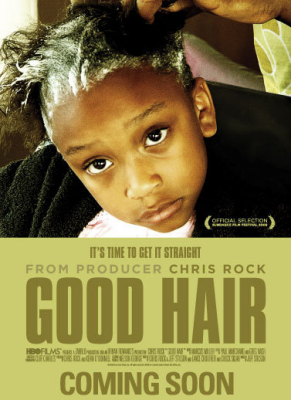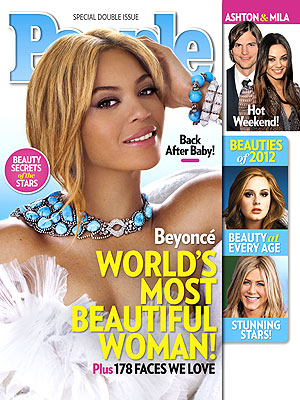After I posted about Rhonda Lee, a meteorologist who was fired after defending her “ethnic” hair on Facebook to a racist and sexist commenter, I was thinking about black hair.
Right after I started Reel Girl, I saw an excellent documentary by Chris Rock on this subject called “Good Hair.”
The film begins with stills of Rock’s two young daughters. (I love that this film was inspired by these girls.) While we look at their pictures on screen, we hear Rock:
Those are my daughters, Lola and Zara. The most beautiful girls in the world. And even though I tell them that they’re beautiful every single day, sometimes it’s just not good enough. Just yesterday, Lola came into the house crying and said ‘Daddy, how come I don’t have good hair?’ I wonder how she came up with that that idea?
The film goes on to document just how these little girls got the idea that their hair wasn’t good enough.
In the film, actress Nia Long tells Rock:
There’s always a sort of pressure within the black community, like, oh, if you have good hair, you’re prettier or better than the brown skinned girl that wears the afro or the dreads or the natural hair style…The lighter, the brighter, the better.
Comedian Paul Mooney explains the phenomenon to Rock most concisely:
If your hair is relaxed, white people are relaxed. If you hair is nappy, they’re not happy.
“Good Hair” ends as it begins, with images of Lola and Zara shown at a playground while Rock muses: “So what do I tell my daughters? I tell them that the stuff on top of their heads is nowhere near as important as the stuff inside of their heads.”
A few months after I saw “Good Hair,” I watched nine year old Willow Smith bust out of the gender/ race matrix, exuberantly celebrating her hair and her independence with her hit song and video, “Whip My Hair.”
Willow sings:
Whip your hair back and forth,
Don’t let haters keep me off my grind,
Keep my head up,
I know I’ll be fine.
She explained the song to MTV:
Whip My Hair’ means don’t be afraid to be yourself, and don’t let anybody tell you that that’s wrong. Because the best thing is you.
Just a couple weeks ago, when this picture of Willow, now 12 years old, made the rounds on the internet, her mother, Jada Pinkett Smith, was derided for bad parenting.
Jada responded to the criticism on her FB page:
This subject is old but I have never answered it in its entirety. And even with this post it will remain incomplete. The question why I would let Willow cut her hair. First the ‘let’ must be challenged. This is a world where women, girls are constantly reminded that they don’t belong to themselves; that their bodies are not their own, nor their power or self determination. I made a promise to endow my little girl with the power to always know that her body, spirit and her mind are her domain.
Willow cut her hair because her beauty, her value, her worth is not measured by the length of her hair. It’s also a statement that claims that even little girls have the right to own themselves and should not be a slave to even their mother’s deepest insecurities, hopes and desires. Even little girls should not be a slave to the preconceived ideas of what a culture believes a little girl should be.
Of course, it helps to come off as “sexy” when you’re portrayed in movie after movie as a hero and shown with “hot” sidekicks who are desperately in love with you. Though People covermen do have one thing in common with the women: Denzel Washington is the only African-American ever deemed “sexy” enough to win.
When Rhonda Lee defended her hair to a racist commenter, she wrote:
Little girls (and boys for that matter) need to see that what you look like isn’t a reason to not achieve their goals.
That’s the same reason Chris Rock made his documentary. It’s the same reason Willow Smith wrote her song, and Jada Pinkett Smith spoke up for her daughter. Is Rhonda Lee not famous enough or powerful enough to speak up for herself without getting punished for it?
Please support Rhonda Lee and sign the petition to demand that she get her job back.








Hi morecompassion,
It works for me. I just tried it.
MM
Something is wrong with the link to the petition. It didn’t work in your earlier post either. I tried searching for the petiion on change.org but couldn’t find it.